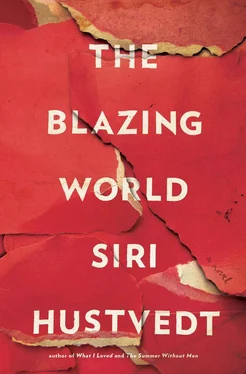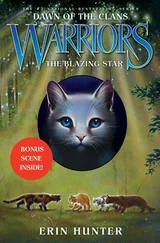“I will rediscover my lost purity, my authenticity.”
(Harry rushes around my living room, lifting up cushions and paging through a magazine in eager search. Bursts into laughter.)
“I hope you didn’t laugh at him then,” I said to her, and she answered that she had let him have his moment of cinema or whatever it had been. When they said goodbye, they had both behaved well. I learned later that Anton did not instantly depart for the Himalayas, but stayed around for several months before he disappeared.
But then Harry returned to her fury. She had been so angry at Anton, she said, she could have punched him silly or burned him to a crisp with a single breath.
This was a reference to Bodley, Harry’s imaginary fire-breathing friend, whom I had known about for years.
She was silent for a while, and then she launched into a hesitant preamble: “I don’t know if I should tell you. No, I can tell you. Maybe I shouldn’t. I will. There’s something in me, Rachel, something I don’t understand. I felt it when I wanted to kill Anton. I’m not kidding. I hated him when he was sitting there in my apartment. I was afraid of myself. What is that? It’s old, Rachel. It’s like a memory in me, but it’s not. I feel it, and it’s been coming up. With Dr. F., I mean. It’s something horrible inside me.”
I thought of Harry’s vomiting. The body can have ideas, too, can use metaphors.
And then, with her hands gripping my wrists, she said that more and more she was haunted by a feeling that there was a hidden story somewhere inside her, something she couldn’t articulate because she didn’t know what it was, didn’t know whether it was real or imagined. “It scares me to pieces, Rachel. It’s fear alone, cold, frozen fear with no image, no pictures, no words. This is how people create false memories, out of fears and wishes, ugly dreamlike thoughts that infect them like a virus.”
Harry’s face was white.
I talked about fantasy then, which lies at the heart of my work with patients, but the inner world and the outer world can be difficult to separate, and the place where they conjoin or divide has been a blurry business in psychoanalysis from the beginning. We invent them, I said to Harry, the people we love and hate. We project our feelings onto other people, but there is always a dynamic that creates those inventions. The fantasies are made between people, and the ideas about those people live inside us.
“Yes,” she said, “and even after they die, they are still there. I am made of the dead.”
I had never heard anyone say it just that way: I am made of the dead.
Over ten years later, I can still see Harry in my living room performing her Anton skit, the parodic gesticulations of her protégé-pseudonym front. Time has thickened it, given it additional meaning because of the events that followed, especially her relationship with Rune. And now, as I recall her gestures in my living room and her grinning face, I feel haunted. Her melodramatic movements do not belong to the youthful hero who bids his lover (or mother) goodbye before he leaves for an adventure. They are the mincingly feminine gestures of the heroine, that creature who starred in countless plays and silent films, the golden-haired darling of heaving breast and rosebud lips, defending herself against the dastardly mustachioed villain who threatens her virtue. That day in my apartment Harry played Anton as a girl, which was in itself a form of revenge.
She projected onto him her vulnerable girl-self, the child that, I suspect, had been roaring back in her work with Adam Fertig. She had said to me that she felt only fear — without pictures or words. But she had already created figures and images from that emotion in her boxes. There is no doubt that Anton was Harry’s pawn. She had wanted an empty male vessel to fill with art, but Anton was not hollow. He was a person, and he was the one who had lived the adulation, who had been feted and touted, not Harry. He had come to her and claimed his rights as an agile performer, another kind of artist, to be sure, but an artist nevertheless. And I think Harry envied and despised him for his deftness. She had been naïve. She had imagined she could borrow the husk of a man for her revenge, but human beings aren’t disguises. If Anton had found himself caught in the net of Harry’s fantasies, she, in turn, had discovered that her protégé had his own dreams.
All thoughts of revenge are born of the pain of helplessness. I suffer becomes You will suffer . And let us not lie: Vengeance is invigorating. It focuses and enlivens us, and it quashes grief because it turns the emotion outward. In grief we go to pieces. In revenge we come together as a single pointed weapon aimed at a target. However destructive in the long run, it serves a useful purpose for a time.
I told Harry a story that afternoon because it seemed somehow relevant. I once had a patient who had been brutally assaulted when she was eleven years old. The man attacked her while she was walking home from a friend’s house on the Upper West Side. It was not a mugging; he leapt at her with a knife, sliced her neck open, and left her bleeding on the sidewalk. She nearly died. My patient reported that she had had no revenge feelings against the perpetrator. But years later, when a boyfriend left her, she couldn’t stop fantasizing about her ex-lover. She manufactured car and skiing accidents, terrible falls, illnesses, and sudden explosions, all of which he survived, but disfigured and paralyzed. In this maimed state, he would inevitably come to recognize that she was the great love of his life, that without her nothing he did had any meaning. After a while, images of his broken and bloody body would intrude on her thoughts suddenly and without warning. She had bouts of depersonalization, during which she would leave cruel messages on the man’s answering machine: I hope you get run over on your way home from work . She frightened herself. We spent session after session unpacking the meanings of the compulsive fantasies.
All Harry said was, “She must have had a scar.”
Yes, I told her, I had seen my patient’s scar: a clean, terrible line that had become a fold in the skin of her neck.
That night I dreamed I was in a long, empty corridor, and I saw Harry hunched over on the floor. I walked toward her and noticed a thin, deep cut in her neck. I began to worry that her head would fall off, and I gripped her neck to keep her head on. At my feet lay a piece of scrap lumber with a few nails sticking out of it. I must have let go of Harry, because I picked it up. A pair of tiny green eyes blinked and a red mouth began to move quickly, as if it were trying to speak to me. I heard nothing but was overcome by a feeling of pity. The sun from the window shone straight into my eyes, blinding me, and then I woke up.
There are many ways to untangle and interpret the bizarre condensations and displacements of dreams. My patient’s scar returned in Harry’s sliced neck. I must have been afraid one of us would “lose her head.” Of course, the dream is more about me than about Harry, although the half-alive piece of wood might have been an image of Harry’s work, which expressed deep parts of herself that were difficult to articulate in other ways. I’m not sure. Almost every day I sit with people, and I listen to them. Sometimes, with particular patients, I worry that I don’t really hear them. They are all trying to make sense of their stories, after all, just as Harry was; Harry, who had told me she believed there was something “terrible” hidden inside her.
Phineas Q. Eldridge (written statement)

Читать дальше













